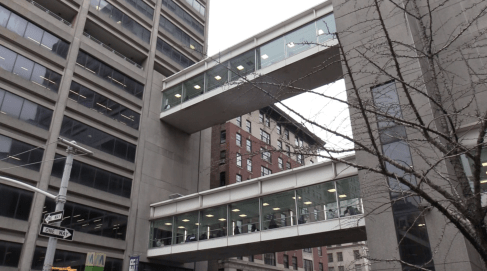Like a majority of college students, Hunter College student Marissa Cronin had never taken an online class before — that is until the coronavirus pandemic hit and every CUNY college abruptly shifted to remote learning.

Photo by Afia Eama
While many college campuses in the city allowed students back on campus by the fall of 2020, CUNY classes remained largely remote with some exceptions. For Cronin, that meant her entire junior year of college was spent tuning into class from her house.
This spring, Cronin said one professor set up a live course as an asynchronous class, where students do not attend a live lecture and instead complete coursework on their own time.
“I forgot we had a midterm during class time, so I completely skipped my midterm and I got a zero,” Cronin said. “I realized like five minutes after. That is something I never would’ve done in-person at all.”
The professor drops the lowest test grade, so Cronin said her moment of panic wavered quickly.
“Online learning during a pandemic is better than no learning, but it obviously cannot live up to in-person classes, especially discussion-based classes,” she said.
Remote learning comes with challenges like staying on top of classwork, technical issues, and a lack of social interaction with professors and peers, according to InsiderEd. All that on top of the challenges students are facing due to the pandemic like financial burdens, the passing of loved ones, and food insecurity have pushed some students like freshman Jannatun Nazifa to consider taking a semester off.
After a semester of online classes, Nazifa said she considered taking a semester off until in-person classes resumed. Nazifa grew frustrated over her online courses and between them and not being able to go outside.
“There is no scope to make friends, have study groups, talk to them about homework,” she said. “That affects my ability to understand the course material.”
The computer science major said she did not end up taking a semester off, partly because of her parents, but also because staying in college means staying occupied.
“The thought of taking a semester off crossed my mind multiple times because of my mental health,” she said. “Since the pandemic happened, I just feel very weary and heavy inside.”
About a quarter of 2020 highschool graduates delayed their college plans, according to a survey from Junior Achievement and Citizens, an education nonprofit. The most common cause was financial struggles.
National college enrollment dropped by 2.5% in the fall of 2020, twice the rate of decline compared to 2019, according to the National Student Clearinghouse Research Center. CUNY saw about a 2.9% decline, similar to national rates, according to a university financial report.
Overall enrollment in CUNY’s four-year colleges increased about 1%, according to the report. The enrollment was measured by FTE, a count of students enrolled for one full academic year, as calculated by credit hours.
Only four senior colleges had drops in enrollment, including City College, Medgar Evars, York College, and the NYC College of Technology, with the highest decline of about 850 FTE enrollment. Community colleges saw a 12% decline.
Enrollment at Hunter, on the other hand, rose from 23,193 in 2019 to 24,052 in 2020, according to the report. The retention rate, which refers to the percentage of freshmen students enrolled in one fall semester who return the following year without graduating, was declining pre-pandemic at Hunter. In 2018 it was 81% — lower than it had been in the past decade, according to CUNY retention data.
When enrollment declined, CUNY’s revenue followed. According to the financial report, revenue collections were projected to decrease by 2% or $30 million into 2021. Since 2019, CUNY “community colleges have experienced $68.7 million in tuition revenue losses,” the report states.
However, the university is projected to end 2021 in a positive condition due to money from the federal government, according to the report.
“Enrollment declines and negative financial impacts of the COVID-19 pandemic have created or exacerbated instability at some individual colleges, particularly once the federal funds are exhausted,” the report stated. Many colleges have to “utilize a large portion” of their funds to get by due to coronavirus’ impacts on revenue.
CUNY is reopening this fall and requiring vaccinations for everyone with in-person classes, according to an email from Chancellor Felix Matos Rodriguez.
“I cannot say it strongly enough: This is the most important thing each of us can do to keep the coronavirus under control moving forward,” Rodriguez wrote.

